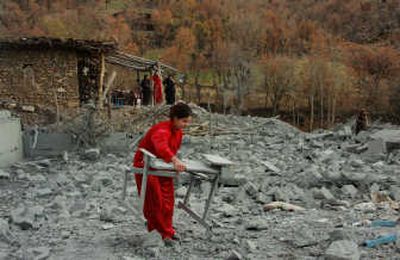Turkish warplanes strike at Kurdish rebels in Iraq

ANKARA, Turkey – Turkey said dozens of its warplanes bombed Kurdish rebel targets as deep as 60 miles inside northern Iraq for three hours Sunday, the largest aerial attack in years against the outlawed separatist group. Turkey’s military chief said the U.S. gave intelligence and tacit approval for the raid.
An Iraqi official said the planes attacked several villages, killing one woman. The rebels said two civilians and five rebels were killed.
In the nighttime offensive, the fighter jets hit rebel positions close to the border with Turkey and in the Qandil mountains, which straddle the Iraq-Iran border, the Turkish military said in a statement posted on its Web site. It said the operation was directed against the rebels and not against the local population.
As many as 50 fighters were involved in the airstrikes, private NTV television and other media reported. Turkey has recently attacked the area with ground-based artillery and helicopters, and there have been some unconfirmed reports of airstrikes by warplanes.
The attack came a month after the United States promised to share intelligence with Turkey about the Kurdistan Workers’ Party, or PKK, and Turkey’s military chief, Gen. Yasar Buyukanit, said U.S. intelligence was used.
“America gave intelligence,” Kanal D television quoted Buyukanit as saying. “But more importantly, America last night opened (the Iraqi) airspace to us. By opening the airspace, America gave its approval to this operation,” he said.
Journalists were barred from entering the stricken areas, but some managed to sneak into the small village of Qlatooka, in Qandil, where bombs had destroyed a school and some homes.
Mukhlis Khadar, 44, said he and his family were woken by the raids and fled their home as soon as the school was hit.
“We left an unbelievable scene behind us,” Khadar said. “When we climbed the rocks of the nearby mountain … we saw flames of fire burning our village. … Our house disappeared.”
Saoqo Mohammad, a 30-year-old woman said: “We are civilians, with no arms or any relation to the PKK, why do they allow such horrible acts against civilians?”
Jamal Abdullah, a spokesman for the regional government of Iraqi Kurdistan, said: “We call on the Turkish army to differentiate between the PKK and the ordinary people. We don’t want the conflict between the Turkish troops and the PKK to turn into a conflict between the Turkish forces and the people of Kurdistan.”